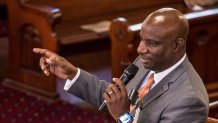The Rev. Mark Kelly Tyler is the 52nd pastor of Mother Bethel African Methodist Episcopal Church in Philadelphia and is a native of Oakland, California. Mother Bethel has the distinction of being the birthplace of the African Methodist Episcopal denomination and founded by Bishop Richard Allen in 1794. The land that the bishop purchased for the church in 1791 is the oldest parcel of land continuously held by African Americans. The current building, the fourth structure, was dedicated in 1891 and is designated as a National Historic Landmark. The Richard Allen Museum, housed in the church, is an international tourist destination. Tyler has appeared in and consulted on numerous films about religion and culture, such as on Dr. Henry Louis “Skip” Gates’ PBS documentary, “The African Americans: Many Rivers to Cross.” He’s also a documentary filmmaker, radio host, motorcyclist, an adjunct faculty member at Payne Theological Seminary and an affiliated faculty member of Methodist Theological Seminary. He’s a proud member of Alpha Phi Alpha fraternity, husband and father of four children.
This is the 16th part of a series where civil rights leaders, cultural influencers, advocates and critical thinkers explain race relations, societal change, community protest and the political awakening happening in the United States following the tragic deaths of George Floyd, Breonna Taylor, Ahmaud Arbery and other Black Americans. The group, including NAACP President Derrick Johnson and #OscarsSoWhite Creator April Reign, pose their thoughts on race relations during the summer of 2020 and how America may move forward less divided. Join the conversation on social media using #PassTheMic.
The Rev. Mark Kelly Tyler, Pastor, Mother Bethel African Methodist Episcopal Church

Our nation has yet to deal with the realities described more than 50 years ago in the Kerner Commission Report. Until we deal with the systemic issues that have resulted due to institutionalized racism, we will continue to arrive in the same place.
The Rev. Mark Kelly Tyler
Q: How would you describe the civic unrest occurring in America right now?
A: Predictable. Many of the persons in what I call the "movement space" have been calling this for years. While the uprising in our nation began rightfully so in response to the horrific murders of Breonna Taylor, Ahmaud Arbery, and George Floyd, the underlying conditions have been building for some time. Our nation has yet to deal with the realities described more than 50 years ago in the Kerner Commission Report. (The Kerner Commission, appointed by President Lyndon Johnson, concluded: "Our Nation is moving toward two societies, one black, one white - separate and unequal.") Until we deal with the systemic issues that have resulted due to institutionalized racism, we will continue to arrive in the same place.
Q: Is this a fleeting moment or have we reached an inflection point where lasting change is possible?
A: Each time we come to a place like this (Trayvon, Ferguson, etc), we like to say that "this one is different". Yet, I must confess, this IS different. For the first time in recent history, law enforcement is facing unprecedented scrutiny and is being asked to answer difficult questions. Whether this moment will be fleeting or not will be based on our ability to leverage it for real reforms. Can "defund the police" move from a mantra to real policy change remains to be seen. It is certainly possible that this movement can forever change the face of 21st policing as we know it, but it will require a type of focused organizing that we have not seen in some time.
Q: Is there another moment in history that relates to the moment we are living through now?
A: Based on everything that I've read and from eyewitness accounts, 2020 is the closest thing that we have had since 1968.
Q: What specifically needs to happen for Black lives to matter in the United States?
A: America must begin by admitting fault in all ways that it was complicit in the institution of slavery. Government, churches, schools, housing, medicine, science, etc. Following the admission of guilt, reparations must be paid to compensate for the stolen labor of Black Americans. Meaningless symbols and gestures without compensation will do nothing to close all the gaps between Black and white (wage gap, education gap, wealth gap, etc).
Q: What does social justice mean to you personally and why should others care?
A: My Christian faith borrows from this passage: " “He has told you, O man, what is good; and what does the Lord require of you but to do justice, and to love kindness, and to walk humbly with your God?” (Micah 6:8). Note that the writer says to DO justice. In other words, justice is not a noun. It is not a person, place, or thing. It is a verb. Justice is something we must do, it is not a place to visit. In that sense, justice means that we must ensure that all yokes of oppression are broken in the lives of all citizens. Until we are all free, none of us are truly free.
Q: What solutions will heal racial divisions and disparities?
A: In addition to reparations, we should revisit the Kerner Commission Report. Many of the recommendations from 1968 hold true today and should be updated. To paraphrase a famous line from "The Color Purple," until America does right by Black people, it will never live up to its highest potential.
Q: How do you feel about the future?
A: In spite of it all, I remain hopeful. The reason people continue to have children, I believe, is rooted in our shared hope that this world can improve. Doing the work of justice is hard. That's why it's called "the struggle." We must wrestle with systems that seek to oppress and hold down. But I find hope in the amazing people who are showing up at this moment.

